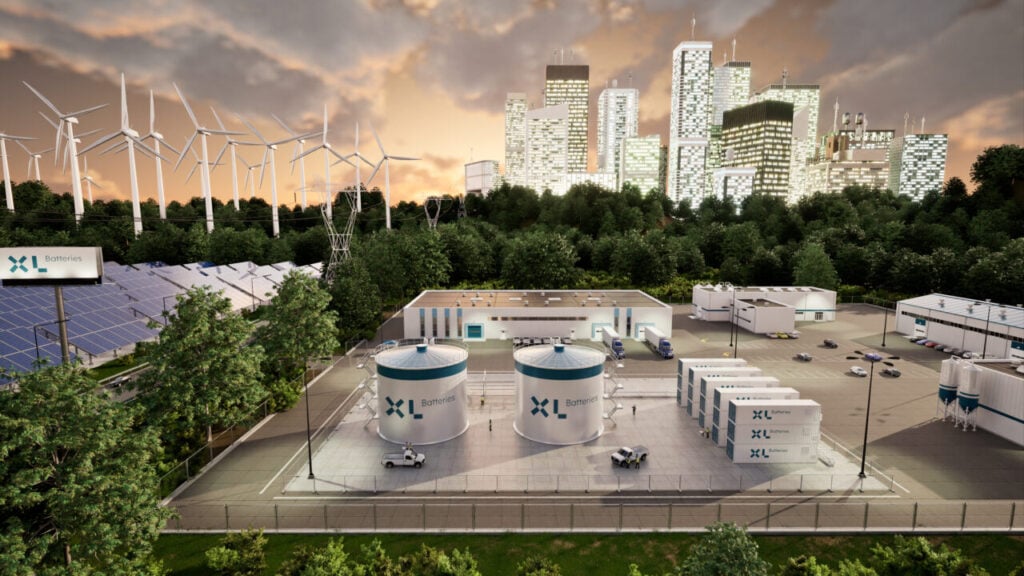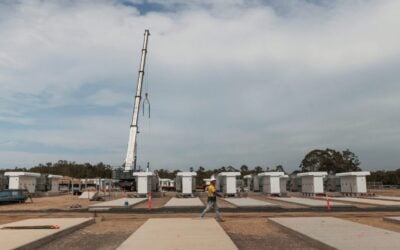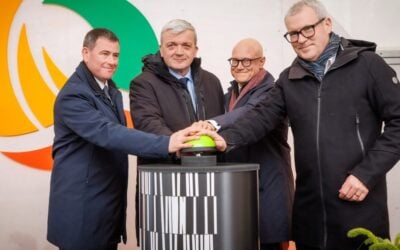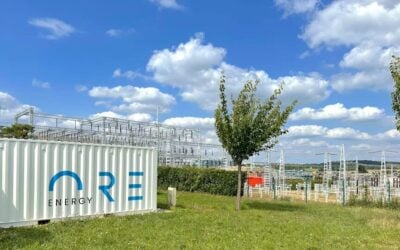
A trio of energy storage startups: XL Batteries, Unbound Potential and Fourth Power, have raised financing for emerging flow battery and thermal storage technologies.
Each is traversing the so-called Valley of Death between R&D and commercialisation, hoping to find a niche or alternative applications where customers may choose a non-lithium battery technology to meet their needs.
Breakthrough Energy Ventures, Munich Re among investors in thermal storage startup
US thermal energy storage (TES) startup Fourth Power has raised US$20 million from the venture capital (VC) investment arm of insurer Munich Re, VC investor DCVC and Bill Gates’s Breakthrough Energy Ventures.
The Massachusetts-headquartered company, a spinout from the labs of MIT and Georgia Tech, announced the successful conclusion of its Series A Plus funding round last week (16 September). It follows a US$19 million Series A concluded in 2023.
Try Premium for just $1
- Full premium access for the first month at only $1
- Converts to an annual rate after 30 days unless cancelled
- Cancel anytime during the trial period
Premium Benefits
- Expert industry analysis and interviews
- Digital access to PV Tech Power journal
- Exclusive event discounts
Or get the full Premium subscription right away
Or continue reading this article for free
Fourth Power has developed a TES system that can scale from 5-hour to 100-hour+ durations to provide long-duration energy storage (LDES), at a cost claimed by the company to be ten times lower than lithium-ion batteries.
The technology uses graphite heaters to heat liquid tin to a peak temperature of 2,400 degrees Celsius. The molten metal is then pumped through a closed-loop network of graphite pipes, transferring heat to storage blocks made of carbon.
The carbon blocks then retain heat effectively, only losing 1% a day thanks to a metre-thick carbon-based insulation and an oxygen-free environment. To discharge and generate electricity, the company uses a thermophotovoltaic (TPV) cell.
While Fourth Power readily reveals that the technology combination results in a relatively low round-trip efficiency (RTE) at just 50%, the system will be so cheap to deploy that it would more than make up for efficiency losses. Fourth Power claims a cost of <US$25/kWh-e and <US$1/W is achievable.
The investment will be used to put a first 1MWh-e demonstration project into action using full-scale commercial components, which Fourth Power claims can are abundant and can be sourced domestically within the US. It hopes to announce its first commercial partnerships in 2027, the company said.
Early-stage startup ‘negotiating for Europe’s biggest flow battery project’
“By 2040, the world will need three times more batteries than supply can deliver,” according to Antonia Albert, a principal at Swiss VC investment firm Founderful.
Founderful has just led a €14.4 million (US$16.97 million) pre-seed financing investment round in Unbound Potential, a fellow company headquartered in Switzerland, which is working to commercialise a membrane-free redox flow battery technology.
The company claims the system’s design can help it reach mass production faster and more cost-effectively than competitors.
While the advantage of flow batteries is that the tanks that hold liquid electrolyte can be scaled up in size to increase storage capacity without the commensurate need for more cell stack and balance of system (BOS) components that lithium-ion BESS technologies require, Unbound Potential’s thesis is that the membranes in other companies’ flow battery stacks are fragile, costly to produce and difficult to scale.
Its unique two-tank design means that instead of a membrane separating electrolytes, ion exchange is controlled by non-miscible electrolytes. Eliminating costly and complex manufacturing steps also means a lower-maintenance product, Unbound Potential claims.
The flow battery maker’s technology will be trialled by online retail giant Amazon. As reported by Energy-Storage.news in October last year, Unbound Potential was selected after entering an Amazon climate tech accelerator programme.
“Early pilots with AI data centres, EV fleet operators and grid players confirm market pull and urgency,” Founderful’s Antonia Albert said, claiming that Unbound Potential has “created the simplest, fastest-to-produce battery in the world.”
Also participating to provide around €8 million in non-dilutive grants and around €6.4 million in investment were co-lead, European industrial tech investor Kvanted and Switzerland’s Zürcher Kantonalbank (ZKB), while the flow battery company has a number of other backers.
Unbound Potential claims that its battery will last more than 20,000 cycles and operate with up to 85% RTE, although it is yet to produce commercial-scale systems. It said the first will be deployed in its Swiss hometown of Thalwil by mid-2026.
The company also claimed to be in the running to supply a 800MW/1.6GWh flow battery project planned for deployment in Laufenberg, Switzerland. Constructed at a data centre complex, it would be Europe’s biggest flow battery system by far.
Developer FlexBase Group received local construction approval in May, aiming for commissioning by 2028. Speaking with Energy-Storage.news at the time, a FlexBase spokesperson said the scaling up of flow battery projects in Europe was due its time.
The spokesperson said the levelised cost of storage (LCOS) for flow batteries falls relative to a project’s size. Coupled with the expectation of durability, the technology starts to become competitive with lower capex options such as lithium-ion (Li-ion) batteries.
FlexBase and real estate developer partner ERNE Gruppe filed an updated building application in September 2024 for its Laufenberg technology centre campus, which included a 500MW battery storage system based on a “non-flammable and non-explosive” battery technology. This was the first hint that Flexbase had chosen flow batteries.
In its announcement of the seed funding, Unbound Potential said it is in negotiations with FlexBase regarding the Laufenberg project.
US domestic supply chain flow battery provider XL Batteries raises US$7.5 million
XL Batteries, another flow battery company pursuing opportunities in the data centre space, has raised US$7.5 million to accelerate the commercialisation of its technology.
US entrepreneur and philanthropist Seth Merrin’s family investment office, Merrin Investments, has invested, with the founder claiming XL Batteries is “rewriting the rules of industrial-scale storage.”
“Its breakthrough, non-flammable technology delivers lower cost, longer life and greater safety than anything else on the market,” Seth Merrin said.
Like the aforementioned Fourth Power, XL Batteries is headquartered in Massachusetts, US, but spun off from research out of Columbia University.
It is developing a flow battery based on an undisclosed proprietary organic electrolyte chemistry. Founder and CEO Dr. Thomas Sisto told Energy-Storage.news in March that the chemistry was discovered “serendipitously” when testing the ability of a type of paint to store a charge.
Sisto said XL Batteries’ “real invention” was in figuring out how to dissolve the molecules into pH-neutral water.
“We are the same as a vanadium flow battery for all intents and purposes, but take the vanadium out and take the sulphuric acid that the vanadium is dissolved into and replace it with organic molecules and pH-neutral water,” Sisto said.
The company has also played up the claim that its materials and components can be sourced domestically and the systems manufactured in the US, potentially giving it an advantage in the current policy-driven market environment, as Sisto wrote in a guest blog for this site in July.
Having raised US$10 million seed funding in 2023 and brought on board former A123 Systems CTO and co-founder Dr. Bart Riley as CCO that same year, XL Batteries commissioned its first commercial pilot in Texas a few months ago.
Speaking again with Energy-Storage.news, Sisto said in April that the project’s undisclosed size and scale were relatively modest by design.
The CEO said flow battery technology is already proven to work at scale. The pilot, with global storage terminals provider Stolthaven Terminals, is intended to “generate high-quality operational data that demonstrates how our proprietary commercial technology performs in the field compared to conventional vanadium-based flow batteries.”
About a month later, data centre developer Prometheus Hyperscaler signed a multi-year agreement to use XL Batteries’ organic flow batteries, making tentative plans to deploy a 12.5MW/125MWh (10-hour) long-duration energy storage (LDES) system in 2028 and another of the same size the following year. Sisto has claimed XL Batteries can achieve costs of less than US$200/kWh for long-duration applications.





